Autoimmune & Chronic Illness
TREATMENTS MENU:
As autoimmunity continues to rise, now close to 20% of the population in the Western world, it is becoming increasingly important that patients have options for their treatment. And an understanding that autoimmune issues can be reversed, put into remission, or greatly helped with an approach that seeks to understand and resolve the root issues that underly these conditions. Autoimmune treatment at our clinic uses this approach.
What Are Autoimmune Issues?
If you have an autoimmune disease, somewhere along the way the immune system went rogue due to inflammation and began attacking its own tissues. In some cases it’s the thyroid, in others it’s the intestines, the skin, the brain, the pancreas, or another organ. But no matter which part of the body is affected, the part of the body needing re balancing is the immune system. This means that in order to treat, prevent, and reverse autoimmune disease we need to get the immune system balanced.
However, under the conventional medical system, autoimmune diseases are not recognised as diseases of the immune system as a whole. Instead they are treated as diseases of particular organs. Unfortunately, that means that there isn’t a unified branch in conventional medicine to treat autoimmune conditions.
If you are suffering from an autoimmune disease, you will see a specialist who focuses on the organ system that is being affected: a rheumatologist for rheumatoid arthritis; an endocrinologist for Hashimoto’s and diabetes, a gastroenterologist for celiac, ulcerative colitis and Crohn’s; a dermatologist for psoriasis; and so on. If you have multiple autoimmune conditions, as many people do due to the inflammatory process affecting multiple bodily systems, you will see several different specialists, each of whom will likely give you a new diagnosis and prescribe a different medication. There is a good chance that none of these specialists will look at how to strengthen and support your immune system, or address other underlying factors such as stress, toxic burden, gut health, and nutrition.
A Different Approach
In conventional medicine, the belief is that once you have an autoimmune condition, there’s nothing you can do to reverse it, only ways to manage the symptoms. Managing the symptoms typically involves harsh medications that are aimed at suppressing your immune system. Since they suppress the entire immune system, they are not without many unwanted side effects such as fatigue, weight gain, depression, increased infection rates and even cancer.
In contrast, the functional medicine approach to autoimmune treatment that we practice; sees the body as a whole and works on the principle that the health of one system impacts the health and function of the others. Instead of focusing on symptom suppression and management, we focus on supporting and strengthening the immune system by getting to the root of why the immune system is imbalanced and inflamed. At the clinic we have helped hundreds of patients return to vibrant health, off medication, and managing their immune systems successfully. We use a tailored approach, bespoke to each patient’s unique body and needs. We would be delighted to co create your new health with you. Please contact us to see how we can help you understand how to heal from autoimmune inflammation.
Lyme Disease Treatment
 Lyme disease is an infection caused by the bacteria Borrelia burgdorferi (Bb). The bacteria are transmitted to people and animals by the bite of an infected blacklegged tick, Ixodes scapularis, commonly the deer tick. As research develops into the transmission of tick borne disease, there are emerging hypothesis that the Lyme bacterium can also be passed through the placenta of a pregnant woman to the foetus—congenital transmission, and transmitted by other insects.
Lyme disease is an infection caused by the bacteria Borrelia burgdorferi (Bb). The bacteria are transmitted to people and animals by the bite of an infected blacklegged tick, Ixodes scapularis, commonly the deer tick. As research develops into the transmission of tick borne disease, there are emerging hypothesis that the Lyme bacterium can also be passed through the placenta of a pregnant woman to the foetus—congenital transmission, and transmitted by other insects.
Conventional medicine lyme disease treatment holds that a short course of antibiotics will clear the infection. Unfortunately this is not the case for many. A growing number of people are finding multiple debilitating symptoms are lasting months and years. One tick bite can also give people more than one tick-borne disease (co-infection). The Borrelia spirochete bacterium is a hardy and clever organism. It can penetrate the brain blood barrier, the lymphatic system and all organs, creating a complex picture of symptoms that can be physical, neurological and emotional:
- Fatigue
- Brain Fog
- Cognitive impairment
- Mould sensitivity/toxicity
- Joint/Muscle pain
- Autoimmune issues
- Food sensitivities
- Anxiety/Depression
- Neurological problems
- Changes in sight
- Mood swings/ changes in personality
- Night sweats
Lyme disease is known as ‘the great imitator’ for good reason. Patients we see have often been previously diagnosed with Fibromyalgia, CFS, MS, auto immune diseases amongst others. At no point are they advised to look at Lyme disease as a possible underlying factor. When symptoms indicate it, this should be ruled out. However GP’s and consultants are not trained to look for the signs of Lyme disease in their patients.
Unfortunately another barrier to treatment is that the NHS test for Lyme disease is inaccurate. It also does not test for the co-infections that are very often concurrent with Lyme disease, notably Babesia, Bartonella, Mycoplasma, Ehrlichia, as well as various viral infections.
Here at Harley Street Autoimmune Clinic, we always seek to understand the root cause of symptoms. This leads us to test for Lyme disease in certain patients whose symptoms are indicative of Lyme, using the most advanced and accurate testing available in Europe. If you have already been diagnosed, then we provide a vastly more in depth treatment plan than conventional medicine offers. Our Lyme Disease treatment addresses all facets of it.
The Lyme patient is often nutritionally deficient, showing multiple mineral imbalances due to long-term chronic infections and stress on the body. They can also have a highly sensitive immune system, and are in a state of inflammation and toxicity. We seek to strengthen the body and only work as fast as is safe and comfortable for the patient, using personalised plans to support the cells and organs before beginning to clear infections and balance the immune system.
Recovery from Lyme and co-infections is entirely possible. We believe a bespoke treatment plan encompassing diet, supplementation and lifestyle can be used to calm distressing symptoms and slowly heal the body from infections, inflammation, and toxicity.
For an appointment for Lyme Disease treatment at Harley Street Clinic
Contact Deborah’s Medical Secretary for an appointmentFibromyalgia Treatment
 Fibromyalgia is characterised by long-term widespread pain and a heightened pain response to pressure. Other symptoms may include feeling very tired, sleep problems and poor memory. Some people also report restless legs syndrome, gut or bladder problems, numbness and tingling and sensitivity to noise, lights or temperature. Fibromyalgia is frequently associated with depression, anxiety, and post-traumatic stress disorder. Other types of pain are also often present.
Fibromyalgia is characterised by long-term widespread pain and a heightened pain response to pressure. Other symptoms may include feeling very tired, sleep problems and poor memory. Some people also report restless legs syndrome, gut or bladder problems, numbness and tingling and sensitivity to noise, lights or temperature. Fibromyalgia is frequently associated with depression, anxiety, and post-traumatic stress disorder. Other types of pain are also often present.
It is estimated to affect 2–8% of the population. Females are affected about twice as often as males. Fibromyalgia was first defined in 1990 with updated criteria in 2011. The term “fibromyalgia” is from Latin, fibro-, meaning “fibrous tissues”, Greek μυώ myo-, “muscle”, and Greek άλγος algos, “pain”; thus the term literally means “muscle and connective tissue pain”.
The cause of fibromyalgia is not understood by orthodox medicine but believed to involve a combination of genetic and environmental factors.
Fibromyalgia treatment recommendations by orthodox medicine often include getting enough sleep, exercising regularly, and eating a healthy diet. Cognitive behavioural therapy is also thought to be helpful. Pharmaceutical medication is usually for the pain.
At Harley Street Autoimmune Clinic we aim to diagnose the underlying issues that are driving the condition. Each patient is treated as an individual. We do not subscribe to a one-size-fits-all approach. Medical tests are carried out and a Fibromyalgia treatment plan is formulated based on the test results. We have had many patients, whose Fibromyalgia simply disappeared.
If you would like this natural approach to Fibromyalgia treatment
Contact Deborah’s Medical Secretary for an appointmentChronic Fatigue Syndrome
 Many patients have been to their GPs and various consultants due to the debilitating symptoms of Chronic Fatigue Syndrome (CFS/ME – Myalgic Encephalopathy). Unfortunately this chronic illness, affecting multiple systems of the body is poorly understood by mainstream medicine. Patients are often prescribed pain-killers, steroids and anti depressants for purely chronic fatigue syndrome symptomatic relief. This does little to resolve symptoms and often leads to unwanted side effects. Chronic fatigue is very often found with many co morbid conditions, so the patient can experience symptoms encompassing multiple systems in the body:
Many patients have been to their GPs and various consultants due to the debilitating symptoms of Chronic Fatigue Syndrome (CFS/ME – Myalgic Encephalopathy). Unfortunately this chronic illness, affecting multiple systems of the body is poorly understood by mainstream medicine. Patients are often prescribed pain-killers, steroids and anti depressants for purely chronic fatigue syndrome symptomatic relief. This does little to resolve symptoms and often leads to unwanted side effects. Chronic fatigue is very often found with many co morbid conditions, so the patient can experience symptoms encompassing multiple systems in the body:
- Extreme fatigue
- Brain fog
- Digestive disturbance
- Joint pains
- Muscle pain
- Rheumatoid arthritis
- Yeast/fungal infections
- Auto immune illness
- EMF sensitivity
- Sensitivity to chemicals
- Poor tolerance for any exercise
- Depression and anxiety
Our chronic fatigue treatment seeks to understand the root of the imbalance and address it at a fundamental level, so that the body is slowly strengthened, and thus symptoms can resolve. We have worked with numerous Chronic Fatigue Syndrome sufferers and helped them permanently reverse the effects of this condition.
Cutting edge tests, not available through the NHS, are used to find imbalances in the individual’s system. These are then addressed with a unique plan incorporating herbal medicine, bespoke dietary plans, and guidance for lifestyle. We understand the sensitivity of the CFS patient’s system and will work slowly and safely, guiding patients to better health. It is our profound belief that chronic illness is not a life sentence, and that full recovery is possible.
If you would like a natural approach to your Chronic Fatigue
Contact Deborah’s Medical Secretary for an appointmentAllergic Rhinitis Treatment as featured in The Guardian
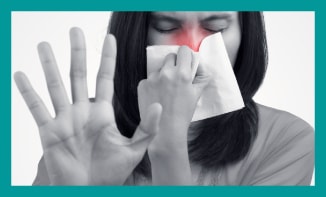 There is nothing more annoying than feeling that constant drip of a sore itchy nose, which can strike at any time (more often than not at highly inconvenient moments). If a persistent runny and stuffy nose plagues you, it will reassure you to know that it can be successfully treated using Natural Medicine.
There is nothing more annoying than feeling that constant drip of a sore itchy nose, which can strike at any time (more often than not at highly inconvenient moments). If a persistent runny and stuffy nose plagues you, it will reassure you to know that it can be successfully treated using Natural Medicine.
If you suffer with the frustrating condition of Allergic Rhinitis, it will strike a chord with you when I talk about attending meetings, giving presentations or generally going about your everyday business with the constant annoyance of a stuffy, running or dripping nose, a persistent nasal itch, coughing, headache and fatigue.
So many of our patients who endure these symptoms confide that they have, understandably, suffered a loss in confidence. They feel unable to fulfil their potential due to this condition being so ‘visible’, ‘persistent’, ’embarrassing’ and the fact it requires them to ‘constantly blow or wipe their nose’.
Many orthodox treatments readily available for Allergic Rhinitis address purely the symptoms and only offer temporary relief. At Harley Street Autoimmune Clinic, we seek to diagnose the underlying health issue that is causing Allergic Rhinitis. We use non-invasive diagnostic medical testing to investigate and determine the clear root cause of the symptoms. Natural medicine, which is licensed by the UK Government’s Department of Health and the EU is then given as treatment for Rhinitis.
This addresses the imbalance, which the test results highlight. Each prescription is prepared and dispensed to meet the unique needs of each patient. Our patients find that this natural and gentle approach works better for Allergic Rhinitis treatment than a one size fits all symptomatic treatment.
Excerpt from the testimonial featured in The Guardian newspaper and written by Nicole Jackson, Editor at The Guardian
“…The NHS
After describing my symptoms, I was prescribed antihistamines then a nasal spray. I was disappointed there was no attempt to discover the cause. “GPs get little or no training with allergies so it’s hard for them to refer on,” says Lindsey McManus, of Allergy UK.
…The private clinics
…I have a lengthy consultation, tests and a follow-up…with a medical herbalist, Deborah Grant, who diagnoses “leaky gut”…. My confused immune system is producing antibodies, making it hypersensitive, and causing reactions to things normally tolerated.
Yet “leaky gut” is not a condition that is recognised by the NHS. When I ask Deborah Grant why, she tells me that people once laughed at Galileo. But, given that the NHS tests haven’t thrown up any conclusions, I go ahead with the treatment.
The results
When I talk to my GP, he did not think my symptoms could be linked to my gut. But, after months of not being able to go a day without antihistamines, the supplements seem effective… I am impressed….Even my skin looks better….”
This holistic approach also usually works well for treating any gut issues or IBS symptoms, which are so often associated with Allergic Rhinitis; hence many of these related symptoms also dissipate or disappear too as the body is brought back to its equilibrium.
If you would like an appointment for Rhinitis treatment
Contact Deborah’s Medical Secretary for an appointmentMS (early onset)
 Multiple sclerosis (MS) is the most common demyelinating neurological disease. It can occur in young or older people and is a cyclic (relapsing-remitting) or it can be a progressive disease that continues progressing without remitting. It is thought that inflammation and the presence of autoimmune antibodies against myelin ( the insulating sheath around many nerve fibres, which increases the speed at which impulses are conducted) cause the myelin sheath to break down, resulting in decrease or loss of electrical impulses along the nerve fibres. In progressive MS, neurological damage occurs additionally by the deposition of plaques on the nerve cells to the point where nerve cell death occurs.
Multiple sclerosis (MS) is the most common demyelinating neurological disease. It can occur in young or older people and is a cyclic (relapsing-remitting) or it can be a progressive disease that continues progressing without remitting. It is thought that inflammation and the presence of autoimmune antibodies against myelin ( the insulating sheath around many nerve fibres, which increases the speed at which impulses are conducted) cause the myelin sheath to break down, resulting in decrease or loss of electrical impulses along the nerve fibres. In progressive MS, neurological damage occurs additionally by the deposition of plaques on the nerve cells to the point where nerve cell death occurs.
In addition to this, breakdown of the blood-brain barrier in MS is associated with local inflammation caused by glial cells, which surround neurons and provide support for and insulation between them. Glial cells are the most abundant cell types in the central nervous system. The clinical manifestations of demyelinization, plaque damage and blood-brain barrier disruptions cause variable symptoms, but they usually include impaired vision, alterations in motor, sensory and coordination systems and cognitive dysfunction.
There is strong evidence for a genetic component in MS, although studies suggest that MS is an acquired, rather than an inherited, disease.multiple co-infections could be involved rather than one specific infection.
MS has been linked to chronic infection(s). For example, patients show immunological and cytokine elevations consistent with chronic infections. An infectious cause for MS has been under examination for some time and patients have been tested for various viral and bacterial infections.
Viruses have also been found in MS. Studies found that over 70% of MS brain specimens were positive for infection-associated sequences.
Current reviews point to an infectious process in MS. Although a few studies did not come to this conclusion, most studies have found infections in MS patients. It is interesting that it is the progressive rather than relapsing-remitting forms of MS which have been associated with chronic infections. Therefore, infections might be more important in MS progression than at the start of the disease. Infections may also invade immune cells and alter immune cell function in a way that promotes inflammation and autoimmune activity. As in other neurodegenerative diseases, multiple factors appear to be involved in the development of MS.
At Harley Street Autoimmune Clinic, we aim to diagnose the underlying issues of early onset MS. A treatment plan is then formulated, based on test results – using a Functional Medicine approach along with natural medicine.
If you would like to experience this natural approach to early onset MS
Contact Deborah’s Medical Secretary for an appointmentAlzheimer’s Disease (early onset)
 Alzheimer’s Disease is a family of brain disorders usually found in elderly patients and is the most common cause of dementia. It is characterised by slow, progressive loss of brain function, notable lapses in memory, disorientation, confusion, mood swings, changes in personality. There are language problems, such as difficulty in finding the right words for everyday objects, loss of behavioural inhibitions and motivation and paranoia. Alzheimer Treatment
Alzheimer’s Disease is a family of brain disorders usually found in elderly patients and is the most common cause of dementia. It is characterised by slow, progressive loss of brain function, notable lapses in memory, disorientation, confusion, mood swings, changes in personality. There are language problems, such as difficulty in finding the right words for everyday objects, loss of behavioural inhibitions and motivation and paranoia. Alzheimer Treatment
The course of Alzheimer’s varies widely. The duration of illness can range from just a few years to over 20 years. During this time the parts of the brain that control memory and thinking are amongst the first to be affected, followed by other brain changes that ultimately result in brain cell death.
Alzheimer’s is characterised by distinct changes in brain tissues and cells. Amongst the most notable are the appearance of plaques and tangles of neurofibrils within brain nerve cells that affect junctions between nerve cells (synapses) and nerve to nerve cell communication. These structural alterations involve the formation and depositing amyloid plaques. So are the plaques a defence against infection? This has been suggested by researchers, who have found a bacterium in each plaque.
Recently Alzheimer’s Disease brain infections, both viral and bacterial, have become important. Several infections have attracted considerable attention and some have been found at high incidence in the brains of Alzheimer’s patients. The presence of infections in Alzheimer’s patients has been proposed to be a primary event in the formation of Alzheimer’s amyloid plaques.
It has been proposed that such infections may act as a trigger in Alzheimer’s Disease. Study authors also stressed that systemic infections must be considered as potential contributors to the development of Alzheimer’s.
At Harley Street Autoimmune Clinic, we aim to diagnose the underlying issues of early onset Alzheimer’s. A treatment plan is then formulated, based on test results – using a Functional Medicine approach along with natural medicine.
If you would like to experience this natural approach to early onset Alzheimer’s
Contact Deborah’s Medical Secretary for an appointmentTreatment for Arthritis
 Arthritis pain? Most cases of Arthritis usually respond well to Natural Medicine and lifestyle changes. Why should you learn to live with it, when there is an alternative?
Arthritis pain? Most cases of Arthritis usually respond well to Natural Medicine and lifestyle changes. Why should you learn to live with it, when there is an alternative?
Conventional drugs and their side effects
Modern treatments include symptomatic treatment for arthritis pain and inflammation, intervention with strong toxic drugs and surgical treatment of joint damage. Non-steroidal anti-inflammatory drugs (NSAIDs) are the mainstay of the conventional treatment for arthritis pain. These drugs are COX-inhibitors, which often cause the side effects of stomach erosion and increased bleeding tendency, sometimes leading to death by gastrointestinal haemorrhage.It’s not unusual to hear patients complaining of side-effects and not enough pain relief. We have already witnessed the 2004 withdrawal of the drug, Vioxx, one of the main COX-2 inhibitors, due to increased cardiac deaths. Recent studies have raised serious concerns regarding the long-term safety of all non-steroidal anti-inflammatory drugs (NSAIDs). Some of the most commonly used NSAIDs are in fact more likely to cause heart attacks than Vioxx.
In 2005, a study of more than 9000 people aged 25 to 100, who had suffered their first ever heart attack, was published in the British Medical Journal (BMJ). A significantly increased risk of heart attack was observed for Diclofenac (55% increase), Ibuprofen (24% increase), Rofecoxib (32% increase) and Naproxen (27% increase). The authors concluded that their study suggested that enough concerns may exist to warrant a reconsideration of the safety of all NSAIDs. They also concluded that as serious adverse events are associated with non-steroidal anti-inflammatory drugs, only their limited use can be recommended. Clearly the message from the current research is that non-steroidal anti-inflammatory drugs should not be the first option for the treatment for arthritis pain.
Natural Medicine – Treatment for Arthritis
Most cases of arthritis usually respond well to Natural Medicine and lifestyle changes. It provides gentle, safe and effective treatment, largely avoiding the unwanted side effects of pharmaceutical drugs. There are no ‘standard prescriptions’ for particular conditions. Instead, tailor-made prescriptions are formulated to meet an individual patient’s unique needs. Natural Medicines are dispensed from our own dispensary, using medicine authorised by the Department of Health’s Medicines and Healthcare products Regulatory Agency and licensed by the EU.
The clinical efficacy of Natural Medicine in pain management has already been demonstrated in clinical trials. It has a superior safety and efficacy profile compared to NSAIDs. Professor Reinhard Saller, a rheumatologist based in Zurich, observed that the excellent results he encountered in his own practice attested to its anti-inflammatory and analgesic (painkiller) potential.
If you would like to book an appointment
Ankylosing spondylitis
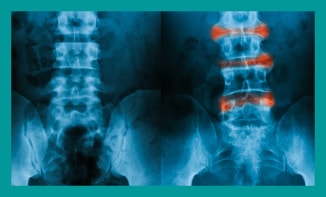 What is it?
What is it?
Ankylosing spondylitis is an inflammatory disease that can cause some of the vertebrae in the spine to fuse together. This fusing makes the spine less flexible and can result in a hunched posture. If the ribs are affected, it may be difficult to breathe deeply.
Ankylosing spondylitis usually affects men more often than women. Signs and symptoms of ankylosing spondylitis typically begin in ankylosing spondylitis early adulthood. Inflammation also can occur in other parts of your body — most commonly, your eyes. Early signs and symptoms of ankylosing spondylitis may include pain and stiffness in the lower back and hips, especially in the morning and after periods of inactivity. Over time, symptoms may worsen, improve or stop completely at irregular intervals.
The areas most commonly affected are:
- The joint between the base of the spine and the pelvis
- The vertebrae in the lower back
- The places where the tendons and ligaments attach to bones, mainly in the spine, but occasionally along the back of your heel
- The cartilage between the breastbone and ribs
- The hip and shoulder joints
Other complications may include:
- Eye inflammation (uveitis). One of the most common complications of ankylosing spondylitis, uveitis can cause rapid-onset eye pain, sensitivity to light and blurred vision
- Compression fractures. Some people experience thinning of their bones during the early stages of ankylosing spondylitis. Weakened vertebrae may crumble, increasing the severity of your stooped posture. Vertebral fractures sometimes can damage the spinal cord and the nerves that pass through the spine
- Heart problems. Ankylosing spondylitis can cause problems with the aorta, the largest artery in the body. The inflamed aorta can enlarge to the point that it distorts the shape of the aortic valve in the heart, which impairs its function
Our approach to Ankylosing Spondylitis, which many patients have been told by orthodox medicine that there is no cure for, is to aim to diagnose the underlying issues driving this condition and address them with a functional medicine approach. The appropriate medical tests are run to identify underlying issues. Based on the results of these tests, a treatment plan is then formulated to meet each patient’s unique needs – using natural medicine licensed by the UK Government and the EU. We do not use a one size fits all approach at our clinic.
If you are interested in a natural approach to your health problem
Contact Deborah’s Medical Secretary for an appointmentAlopecia Treatment
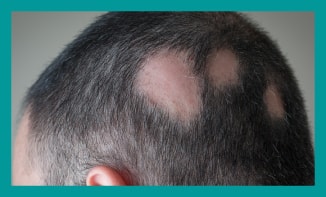 Despite what you may have been told, there IS hope….
Despite what you may have been told, there IS hope….
Harley Street Autoimmune Clinic has welcomed many beautiful individuals experiencing all forms of hair loss (alopecia). A requirement for this dedicated and specialist clinic became abundantly clear following the frustrations alopecia patients spoke of prior to being treated by Deborah Grant, a leading London Consultant Medical Herbalist. Patients spoke of the lack of support they had received from other alopecia treatment medical professionals in their alopecia treatment; the hurtful diagnosis they had been given that their hair would never grow back; they spoke of shame, depression, loss of identity as well as social paranoia; and the inconvenience and itchiness of expensive wigs.
Alopecia is usually caused by a problem with the immune system (the body’s natural defence against infection and illness). It’s more common among people with other autoimmune conditions. Natural Medicine is usually very effective at treating such conditions and results can be seen as the body responds to the medicine and hair growth is stimulated.
We use diagnostic medical testing to investigate and determine the cause of each individual’s hair loss or alopecia. Natural medicine, which is licensed by the UK Government’s Department of Health and the EU is then given to the patient to help bring the body back into equilibrium and to ultimately modulate immune function. Each prescription is prepared and dispensed to meet the unique needs of each patient. Our patients find that this natural and gentle approach works best in alopecia treatment and clear results can usually be seen through the subsequent hair regrowth.
In addition, we address the psychological impact alopecia has on an individual as it is a condition which not only clearly effects the body, but takes a silent toll on the psyche too. Each individual prescription is made to also address symptoms ranging from depression to paranoia, to stress and adrenal exhaustion.
Following alopecia treatment at our clinic, patients speak of regaining their lost sense of identity, of being given hope and encouragement as they witness, over time, the regrowth of their hair.
This holistic approach also usually works well for treating any gut issues or IBS symptoms which are so often associated with alopecia and other autoimmune conditions; hence many of these related symptoms also dissipate or disappear too as the body is brought back to its equilibrium.
If you would like an appointment for alopecia treatment
Vitiligo Treatment
 What is Vitiligo?
What is Vitiligo?
Vitiligo is a condition in which the pigment cells of the skin, melanocytes, are destroyed in certain areas, resulting in depigmented or white patches of skin in any location on the body. Vitiligo can be localised to one area or it may affect several different areas on the body.
Most experts believe that it is an autoimmune condition in which the body’s immune system mistakenly attacks and destroys certain cells within the body. It is not painful and does not have significant health consequences. However, the emotional and psychological impact should not be underestimated.
White patches can also appear on both the mucous membranes (tissues that line the inside of the mouth and nose) and the retina (inner layer of the eye). The hair that grows on areas affected by vitiligo sometimes turns white. The cause of vitiligo is generally poorly understood with doctors and researchers have several different theories.
Who is affected by Vitiligo?
About 0.5 to 1 percent of the world’s population – that’s around 65 million people, have vitiligo. In the United States ofAmerica, 1-2 million people have the condition. Half the people who have vitiligo develop it before age 20; most develop it before they re 40. The disorder affects both sexes and all races equally; however, it is more noticeable in people with dark skin.
Medical symptomatic treatment
A number of symptomatic medical therapies, most of which are applied topically, can reduce the appearance of Vitiligo.
Topical steroid therapy: Steroid creams may be helpful in repigmenting white patches, particularly if they are applied in the initial stages of the disease. These creams can cause side effects. For this reason, patients are monitored closely for skin thinning and skin striae (streaks or lines on the skin).
Psoralen photochemotherapy or psoralen and ultraviolet A therapy (PUVA) therapy: This is probably the most effective symptomatic treatment for vitiligo available in the United States. The goal of PUVA therapy is to repigment the white patches. However, it is time-consuming and expensive, and care must be taken to avoid side effects, which can sometimes be severe. Psoralen is a drug that contains chemicals that react with ultraviolet light to cause darkening of the skin. The treatment involves taking psoralen by mouth (orally) or applying it to the skin (topically). Known side effects of oral psoralen include sunburn, nausea and vomiting, itching, abnormal hair growth, and hyperpigmentation. Oral psoralen photochemotherapy may also increase the risk of skin cancer.
Depigmentation: This treatment involves fading the rest of the skin on the body to match the areas that are already white. Patients apply the drug monobenzyl ether of hydroquinone (monobenzone) twice a day to pigmented areas until they match the already-depigmented areas. The major side effect of depigmentation therapy is inflammation (redness and swelling) of the skin. You may experience itching or dry skin. Depigmentation tends to be permanent and is not easily reversed. In addition, a person who undergoes depigmentation will always be extremely sensitive to sunlight.vitiligo treatment
Natural Vitiligo Treatment
At Harley Street Autoimmune Clinic we diagnose and treat any underlying issues, which may be fuelling the vitiligo. We do not treat just the symptoms. This holistic approach has helped many patients. If you would like to try the natural approach to vitiligo treatment, please Contact to make an appointment and we will be delighted to help you with your health concerns. Our vitiligo treatment addresses the underlying issues.
If you would like to make an appointment for Vitiligo treatment
Contact Deborah’s Medical Secretary for an appointmentLupus Treatment
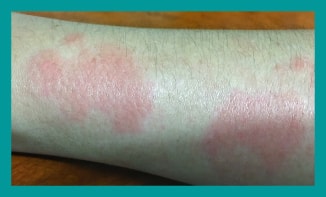 Systemic lupus erythematosus (SLE), also known simply as lupus, is an autoimmune disease in which the body’s immune system mistakenly attacks healthy tissue in many parts of the body, including the organs such as the kidneys, lungs, heart, brain etc.
Systemic lupus erythematosus (SLE), also known simply as lupus, is an autoimmune disease in which the body’s immune system mistakenly attacks healthy tissue in many parts of the body, including the organs such as the kidneys, lungs, heart, brain etc.
Symptoms may be mild to severe. Common symptoms include painful , swollen painful joints; fever, chest pain, hair loss, mouth ulcers, swollen lymph nodes, fatigue and a red rash which is most commonly on the face. There are often flares and periods of remission, when there are few symptoms. Lupus is Latin for wolf as in the 18th century it was thought to be caused by a wolf’s bite.
The cause is not entirely clear according to orthodox medicine. It is believed to involve hormonal, environmental, and genetic factors. The mechanism involves an immune response by autoantibodies against a person’s own tissues. These are most commonly anti-nuclear antibodies and they result in inflammation. There are a number of other kinds of lupus erythematosus including discoid lupus erythematosus, subacute cutaneous lupus erythematosus and neonatal lupus. Patients of orthodox medicine are usually told there is no cure for SLE. Pharmaceutical treatments may include NSAIDs, corticosteroids, immunosuppressants, hydroxychloroquine, and methotrexate – a chemotherapy drug.
Women of childbearing age are affected about nine times more often than men. While it most commonly begins between the ages of 15 and 45 a wide range of ages can be affected. SLE is one of several diseases known as “the great imitators” because it often mimics or is mistaken for other illnesses.
Our aim is to diagnose and address the underlying issues that are fuelling the condition. It is indeed a multi-faceted condition and usually has several drivers.
If you would like a natural approach to Lupus treatment
Scleroderma Treatment
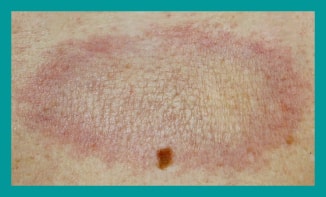
Scleroderma, or systemic sclerosis, is a chronic connective tissue disease generally classified as one of the autoimmune rheumatic diseases. The word “scleroderma” comes from two Greek words: “sclero” meaning hard, and “derma” meaning skin. Hardening of the skin is one of the most visible manifestations of the disease.Scleroderma affects women more often than men and most commonly occurs between the ages of 30 and 50.
Symptoms
Scleroderma’s signs and symptoms vary, depending on which parts of your body are affected:
- Skin. Nearly everyone who has scleroderma experiences a hardening and tightening of patches of skin.
- Fingers or toes. One of the earliest signs of systemic scleroderma is Raynaud’s disease, which causes the small blood vessels in your fingers and toes to contract in response to cold temperatures or emotional distress. When this happens, your fingers or toes may turn blue or feel painful or numb.
- Digestive system. Scleroderma can cause a variety of digestive symptoms, depending on which part of the digestive tract is affected.
- Heart, lungs or kidneys. Scleroderma can affect the function of the heart, lungs or kidneys to varying degrees. These problems, if left untreated, can become life-threatening.
Causes
Scleroderma results from an overproduction and accumulation of collagen in body tissues. Collagen is a fibrous type of protein that makes up your body’s connective tissues, including your skin. The body’s immune system appears to play a role in its development. Most likely, scleroderma is caused by a combination of factors, including immune system problems, genetics and environmental triggers; all of which can be well addressed with natural medicine.
See a testimonial regarding this treatment here.
If you would like to book an appointment for Scleroderma treatment
Contact Deborah’s Medical Secretary for an appointmentCREST Syndrome
 What is CREST Syndrome?
What is CREST Syndrome?
CREST (calcinosis, Raynaud phenomenon, esophageal dysmotility, sclerodactyly, and telangiectasia) syndrome is a member of the group of sclerodermas.
Its name is an acronym for the main clinical features of the syndrome, which are briefly explained below:
Calcinosis
CREST causes thickening and tightening of the skin with deposition of calcific nodules or calcinosis.
Raynaud’s phenomenon
Raynaud’s phenomenon is frequently the first sign of CREST, often preceding other symptoms by years. Stress and cold temperature induces a constriction of the small arteries, arterioles, and thermoregulatory vessels of the skin of the fingers and toes. Fingers and toes turn very pale and even blue until they warm up again. This occurrence is often painful. Sometimes this phenomenon leads to ulcerations, which can predispose to chronic infections of the involved site.
Esophageal dysmotility
This condition presents as a sensation of food getting stuck – dysphagia – in the mid or lower esophagus, chest pain, or cough. Patients often state they must drink liquids to swallow solid food. This motility problem results from atrophy of the gastrointestinal tract wall smooth muscle.
Sclerodactyly
Though it is the most easily recognizable manifestation, it is not evident in all patients. Thickening generally only involves the skin of the fingers distal to the metacarpophalangeal joints in CREST. Early on in the course of the disease, the skin may appear swollen and inflamed. Eventually fibroblasts overproduce extracellular matrix, which leads to increased collage deposition in the skin. Collagen cross-linking then causes a skin tightening. Ulcers commonly form on the distal fingers in 30-50% of patients.
Telangiectasias
Marked telangiectasias (dilated capillaries) occur on the skin of the face, the palms of the hands, and the mucous membranes. The number of telangiectasias and the sites involved tend to increase over time.
Our approach to the treatment for CREST Syndrome is to diagnose and address any underlying issues, which may be causing this condition. We do not give purely syptomatic treatment.
If you would like to book an appointment
Contact Deborah’s Medical Secretary for an appointmentParkinson’s Disease (early onset)
 One person in every 500 has Parkinson’s. That’s about 127,000 people in the UK.
One person in every 500 has Parkinson’s. That’s about 127,000 people in the UK.
Most people who get Parkinson’s are aged 50 or over but younger people can get it too. Parkinsons disease is characterised by slow movement, muscular rigidity and resting tremor. In addition, depression, sleep disturbances and frequently dementia characterise this disease. The pathology of PD indicates a progressive loss of the dopamine neurons of the substantia nigra together with the presence of Lewy bodies and alpha-synuclein. More extensive brain degeneration also occurs, from the medulla oblongata to the cerebral cortex. Inflammation has also been associated with Parkinson’s.
The development of Parkinson’s has been proposed to be due to multiple genetic and neurotoxic events that produce oxidative damage and cell death. In the case of Parkinson’s the relevant targets of toxic events are neuromelanin-containing dopaminergic neurons of the substantia nigra. A case-control study indicated that multiple environmental factors and genetic background were statistically related risk factors for the disease.Prominent among these were long-term toxic exposures and trauma early in life. For example, early life exposure to brain injury, chemicals and/or infections may initiate a cyclic inflammatory process involving oxidative damage, excitotoxicity, mitochondrial dysfunction and altered proteolysis that later in life results in substantia nigra neuron death.
A role for chronic infections in PD pathogenesis has been proposed. One infection found in PD that has aroused considerable interest is the presence of chronic gastrointestinal Helicobacter pylori. Indeed, treatment of this infection offers relief to late stage cachexia in PD patients receiving L-dopa. Helicobacter pylori-infected PD patients showed reduced L-dopa absorption and increased clinical disability, whereas treatment of this infection increased L-dopa absorption and decreased clinical disability. H. pylori may not be directly involved in the pathogenesis of PD, but its systemic presence could affect the progression and treatment of PD, probably by stimulating inflammation and autoimmunity.
Chronic infections in PD have been linked to inflammation and autoimmune responses. Experimental models of PD have been developed using neurological viral or bacterial infections to initiate the pathogenic process. Spirochetes have also been found in Lewy bodies of PD patients. Other infections, such as viral encephalitis, AIDS-associated opportunistic infections of the basal ganglia, coronavirus, among other infections, have been found in PD and could be important in stimulating inflammation and autoimmune responses. It has been stressed that additional research will be necessary to establish whether a causal link exists between PD and chronic infections.
If you would like to book an appointment
Contact Deborah’s Medical Secretary for an appointment